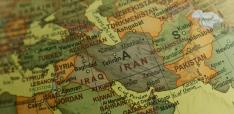At the Heart of the Evil Empire
Normal.dotm
0
0
1
841
4799
Wirtschaft am Wasserturm
39
9
5893
12.0
0
false
21
18 pt
18 pt
0
0
false
false
false
/* Style Definitions */
table.MsoNormalTable
{mso-style-name:"Normale Tabelle";
mso-tstyle-rowband-size:0;
mso-tstyle-colband-size:0;
mso-style-noshow:yes;
mso-style-parent:"";
mso-padding-alt:0cm 5.4pt 0cm 5.4pt;
mso-para-margin:0cm;
mso-para-margin-bottom:.0001pt;
mso-pagination:widow-orphan;
font-size:12.0pt;
font-family:"Times New Roman";
mso-ascii-font-family:Cambria;
mso-ascii-theme-font:minor-latin;
mso-fareast-font-family:"Times New Roman";
mso-fareast-theme-font:minor-fareast;
mso-hansi-font-family:Cambria;
mso-hansi-theme-font:minor-latin;
mso-bidi-font-family:"Times New Roman";
mso-bidi-theme-font:minor-bidi;}
Seen from Tehran, a trip to London looks like a journey to the heart of the Evil Empire. For as much as Europeans tend to regard the United Kingdom as “America’s Poodle”, Iranians perceive Britain as the dark force behind the USA. (They never cared that former US President Reagan had detected the Evil Empire in the Soviet Union anyway.) So whatever bad may happen to the Islamic Republic, it is likely to be interpreted as a joint conspiracy of the ‘Zionist Regime’, the CIA, and the MI6 – the latter mostly known to people worldwide for being the employer of a certain James Bond.
Arriving at Heathrow Airport and later at Paddington Station, what most strikes the visitor from Tehran is the amount of human skin visible. Britons as well as the tourists from all over the world show more of it at 18° Celsius and rain than Tehranis would ever do in sunshine and with temperatures more than twice as high. Most of the skin is of the rosy Anglo-Saxon kind, but of course a metropolis like London unites all the colours of the world – a striking contrast to the fairly ‘pure’ population mix of Iran, where majority Persians are sprinkled with some Arabs and Kurds plus the odd Afghan migrant.
The second striking thing is the quality of public life that even a very regular location such as a train station can contain. It is buzzing with people from all walks of life, at 8 am mostly on their way to work, both men and women dressed fairly equally in either business or casual fashion. What may be epitomous of the anomymity of the Western city with people rushing past each other without much regard, is at the same time and in its sum the construction of publicity. Living in a city where a café culture as we know it does not exist, where there are no tree-lined pedestrian zones for families to sit and stroll freely, merely experiencing the busyness of Paddington Station is a welcoming of sorts to Europe.
Speaking of Europe leads to a third astonishing impression taken from the British capital. When in a discussion with members of the Houses of Parliaments there was talk of the ‘source of all evil’, this was directed at no other city but – Brussels. Of course, the MPs present were only quoting other folks saying so (the more radical MPs from their party, for example, or the average Briton in general), but some did so in order to ask for an understanding of this particular point of view. After all, the British public had the right so feel betrayed – so the argument goes – because the European Union had evolved into something very different than what they entered nearly 40 years ago. Which is why there is now a debate going on whether the UK should hold a referendum on how it would like its EU membership look to be.
Certainly, a majority of the British public would favour having less to do with ‘evil Brussels’ if they had a choice. However, it seems that those who argue for a fundamental reassessment of the UK’s relation with the EU based on a sound popular decision (rather than asking the tricky in-or-out question that they do not want to lose out on) do not want to tell the voters that there may be no ‘special relationship’ available with Brussels. The EU is a club with binding rules for all its members. True, there were some opt-outs available in past treaty negotiations. Yet with integration moving fast in the face of the financial and debt crisis, it is unlikely that the UK can continue its pick-and-choose-membership. The outcome of a mushy how-would-you-like-your-Europe referendum thus might be that Britain will have to withdraw from the EU regardless, because its government simply cannot negotiate the membership terms its voters would like to have.
Given that a UK referendum on Europe may be held by 2015, the interesting question is how it would relate to the other referendum that made the headlines on the British Isles a few weeks ago. Scotland too favours a renegotiation of its relation with – if not outright independence from – England (and Wales). When the British ‘Economist’ recently ran a story how much “Skintland” would stand to lose if it were to go alone, there were nationalist outcries (and counter-cries) in the media through the country (the whole, that is). Interestingly, for many Scottish nationalists London rather than Brussels is the home of all evil, which is why they count on remaining an EU member after an eventual declaration of independence – a position that is doubtful and that the EU’s own legal service does not validate. So the timing of the two referenda will be important, because neither side – neither the Anglo-British eurosceptics nor the Scottish nationalists – would like to see the UK leave the EU first, only to split in two middle-sized non-EU members later.
But that’s for the future. For the more than two weeks starting July 27, London will cease to be the heart of any perceived empire but host of the best athletes of the world. Preparations for the 2012 Olympics are in full swing, with its purple trademark colour making up much of the picture of the inner quarters and on all public transports. Hopefully, even the Iranian sportsmen (and women!) arriving from Tehran can see the city as what it is meant to be for those days: a welcoming and vibrant home for both activists and supporters from all over the world meeting under the open British sky – rain or shine.


